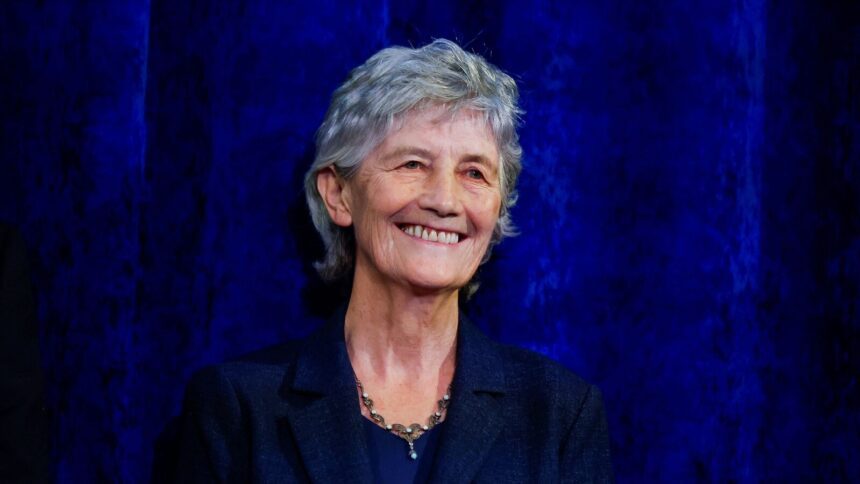Ireland has elected its first openly leftwing independent president in modern history, marking a seismic political shift. Catherine Connolly, a 68-year-old former barrister and Galway MP, has been declared the republic’s next president after securing a landslide 63% of first-preference votes — a stunning result that has shaken the political establishment and redefined the country’s centre of gravity.
“I will be a voice for peace, a voice that builds on our policy of neutrality, a voice that articulates the existential threat posed by climate change,” Connolly said in Dublin Castle on Saturday night, moments after being declared the victor. “Together, we can shape a new republic that values everybody, that values and champions diversity and that takes confidence in our own identity.”
How did Catherine Connolly pull off this historic win?
Of 1.44 million valid votes cast, Connolly won 914,143, far ahead of her nearest rival, Heather Humphreys of the ruling Fine Gael party, who secured 29%. A third candidate, Fianna Fáil’s Jim Gavin, withdrew mid-campaign after a financial scandal but still drew 7% of the vote.
The landslide was, however, clouded by a record 213,738 spoiled or invalid ballots, reflecting widespread frustration with limited choices and political disillusionment. Turnout stood at just 46%, unusually low by Irish standards.
Political analysts attribute Connolly’s rise to a perfect storm of voter anger over housing and cost-of-living crises, fatigue with the centrist establishment, and her deft use of social media to connect with younger voters. Her podcast appearances and viral videos — including one showing her doing keepy-uppy — cemented her image as a relatable, grounded alternative.
Why does Catherine Connolly’s victory matter?
While Ireland’s presidency is largely ceremonial, the symbolism of Connolly’s triumph is profound. It represents a decisive rejection of the traditional Fine Gael–Fianna Fáil duopoly, and a resurgent appetite for anti-establishment, socially conscious leadership.
Connolly’s election also signals renewed debate about Ireland’s foreign policy neutrality. She has pledged to “ringfence Irish neutrality from western militarism” and has accused the UK and US of enabling genocide in Gaza — comments that have divided opinion at home and abroad.
Critics have branded her “radical” and warned that her views could strain Ireland’s relations with Washington and Brussels. Yet her supporters hail her as a voice of moral clarity in an age of political cynicism.
Who is Catherine Connolly?
Born in Shantalla, a working-class suburb of Galway, Connolly was the ninth of 14 children. Her mother died when she was nine, an experience she later said shaped her sense of empathy and justice.
After earning a master’s degree in psychology from the University of Leeds, she returned to Galway, became a barrister and clinical psychologist, and entered politics through the Labour Party. Elected to Galway City Council in 1999, she later served as mayor in 2004 before leaving Labour to run as an independent.
In 2016, she was elected as an independent TD (member of parliament) and gained recognition for her outspoken criticism of inequality and Western intervention in global conflicts. In 2020, she became the first woman elected as the Dáil’s deputy speaker, a milestone that expanded her national profile.
What kind of president will Connolly be?
Though critics warn she may test the boundaries of her office, Connolly insists she will respect the constitutional limits of the presidency. “Our public and democracy needs constructive questioning,” she said in her victory address.
During a televised debate, when asked whether she would confront Donald Trump over allegations of genocide, she replied:
“If it’s just a meet and greet, then I will meet and greet. If the discussion is genocide, that’s a completely different thing.”
Supporters see in her a continuation of the activist tradition of Mary Robinson, Mary McAleese and Michael D Higgins, all of whom expanded the moral authority of the presidency beyond ceremonial duties.
What comes next for Ireland’s new president?
Connolly will be inaugurated next month at Áras an Uachtaráin, succeeding President Michael D Higgins, who congratulated her on Saturday, saying:
“The president-elect will have the full support of this office as she prepares for her inauguration next month.”
Her seven-year term begins amid growing polarisation, with half the electorate feeling unrepresented by either main candidate. Yet, to her supporters, Connolly’s victory embodies a new, progressive Ireland — one that is both sceptical of militarism and fiercely protective of social justice.
As she put it on election night:
“Together, we can shape a new republic that values everybody.”










